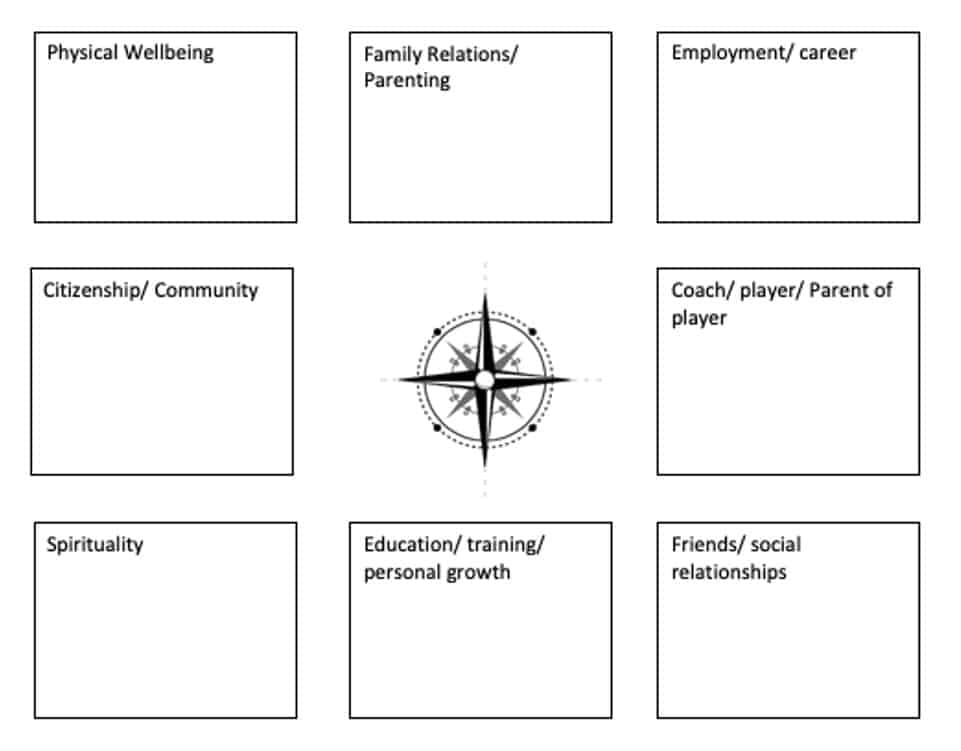Values and Defining Your Why: Part 1
Posted by: Lexi Swenson & Irene Oyang | University of Denver Sport Psychology
As athletes, we often think of ourselves as just that – an athlete. Each individual athlete is their own person affected by the unique world they live in in. Most athletes hold multiple roles within their everyday life (i.e. son/daughter, brother/sister, etc.). Achieving performance excellence is the goal as a striving athlete, but what about who you are off the field? Achieving whole person development is the ultimate goal; finding fulfillment not just as an athlete, but as a person. One way that values can lead you through life’s decisions is by defining who you are at your core. Finding your underlying values as a player can allow one to pursue both performance and personal excellence.
What are values?
Humans are faced with a jaw-dropping average of 35,000 remotely conscious decisions per day. While some of them may be insignificant, such as whether or not to put mayonnaise or mustard on your sandwich, other decisions hold a lot more weight and consequence. Given the astounding amount of decisions we need to make each day, how do we make sure that there is a sense of cohesion in our decisions and actions? What creates the lens through which we view our thoughts, our beliefs, and our behaviors? What helps us navigate life?
Values can be defined as principles or standards of behavior and/or one’s perception of what is important in life. Values can serve as an internal compass that guides you through life’s toughest decisions, providing direction when all else fails. Values serve as the building blocks or the bare bones of our self-identities. It is through our values that we make our decisions and through our decisions each day, we shape who we are as athletes and humans.
Why are they important?
Values serve as our foundation. When faced with hardship or challenging decisions, we can always fall back on what matters most to us (honesty, integrity, family, etc…). Living in congruence with our values and using them to guide our decision-making will allow us to feel more fulfilled.
Values have a cascading effect throughout our lives. Our values inform our decisions, our decisions inform our actions, our actions inform our behaviors, our behaviors then inform our habits, and ultimately, our habits inform our lifestyle. Through this chain reaction of events, we shape our self-identity.
However, it’s important to also note that there should be flexibility within this foundation. While it is important to have a strong sense of your values and identity, it’s equally important to allow space for growth and change. Being overly rigid with values can hinder growth and development. For instance, what you value now may be different than what you valued just a few short years ago. Whether these differences are nuanced or drastic, they are usually due to circumstances in your life that have altered your perception of the world.
For instance, a few years ago, you may have valued being extremely hardworking. You also may have defined being hardworking as the person who put in the most hours, pushed well beyond their limits every day, and never stopped to rest. While this may have shown tremendous progress initially, you eventually found your motivation dwindling, your body and mind drained, and your commitment wavering. Perhaps you even experienced a full-blown burnout. After this experience, you can still value being hardworking (after all, it is a great value to have!), but maybe now you also prioritize proper self-care and recovery. Hardworking no longer means pushing yourself to the brink each time, but also recognizing that recovery is just as essential to sustaining this level of work, dedication, and performance.
With all the above said, it is equally important to have balance. The act of disregarding all other values except the ones you hold closest in that moment can be a disservice to your decision-making. Obviously, one value might take the front seat, but that doesn’t mean you throw away all other important ideals you believe in. As in the aforementioned example, it is ok to value working hard, but putting all your eggs into that basket and disregarding all other values you believe in (i.e. self-care) could be detrimental to both your game and life. It is important to let hard work take the driver’s seat, but put self-care in the passenger seat to ensure balance.
As you learn and develop as a person, your values will develop as well. Your values and identity are synergistic, each serving as a catalyst for growth for the other. While it may seem paradoxical, we must pursue our values vigorously and simultaneously hold them loosely and flexibly. Ultimately the goal is to live through your values and let your values lead you through your journey. This is living a life driven by values.
How do values define our behaviors?
Living by your values means living each and every day making decisions based on who you want to be as a person. Values can look very different for each individual and oftentimes stem from life changing events. Values and beliefs can be flexible through all the domains of your life (i.e. as a player, person, father/mother, brother/sister, son/daughter).
In order to live in alignment with your values, you are striving to make decisions throughout the day with those values in mind. This is what drives your behavior. Although living in alignment with your values is important, you might not always make decisions based on the values you hold at your core. That is ok. We learn and grow from those decisions. Becoming aware of the incongruence and disconnect with our values frequently pulls us tighter to the values we are built on. Being in alignment means noticing when this is the case and then making the decision to fall back on what we are constructed of – our core values.
For example, If a person values health and physical wellbeing, they are more likely to make daily decisions such as exercising 60 minutes per day and following a healthy diet that can increase their long-term wellbeing. Although they may fail to live in alignment with their values on certain days, the misalignment (consuming fried chicken and having a Netflix marathon) will cause the person to feel incongruence with their values. Noticing this incongruence will oftentimes result in internal tension, which in turn prompts a person to reconnect with their values and allow their values to drive their behavior once more.
How do we define our personal values?
As we begin to define our own personal values, it’s important to write them down in order to make them more concrete. For this activity, we ask you to reflect on what matters most to you across all the different domains of your life. In each domain there can be a multitude of values. Multiple beliefs can drive your behavior at practice. In turn, a set of different beliefs can drive your behavior in your relationship with your parents. You may also find that there are overlaps or different values between different domains in your life. Think about what you live by. What drives the behaviors that you do? Consider your values in each domain. Examples include “living a healthy lifestyle” for physical well being or “being the most hard working” for your athletic career. After you have written a few values in each domain, rank the domains from 1 to 10, with 1 being the most important and 10 being the least. (If the domain does not pertain to you, feel free to leave the box empty.)










